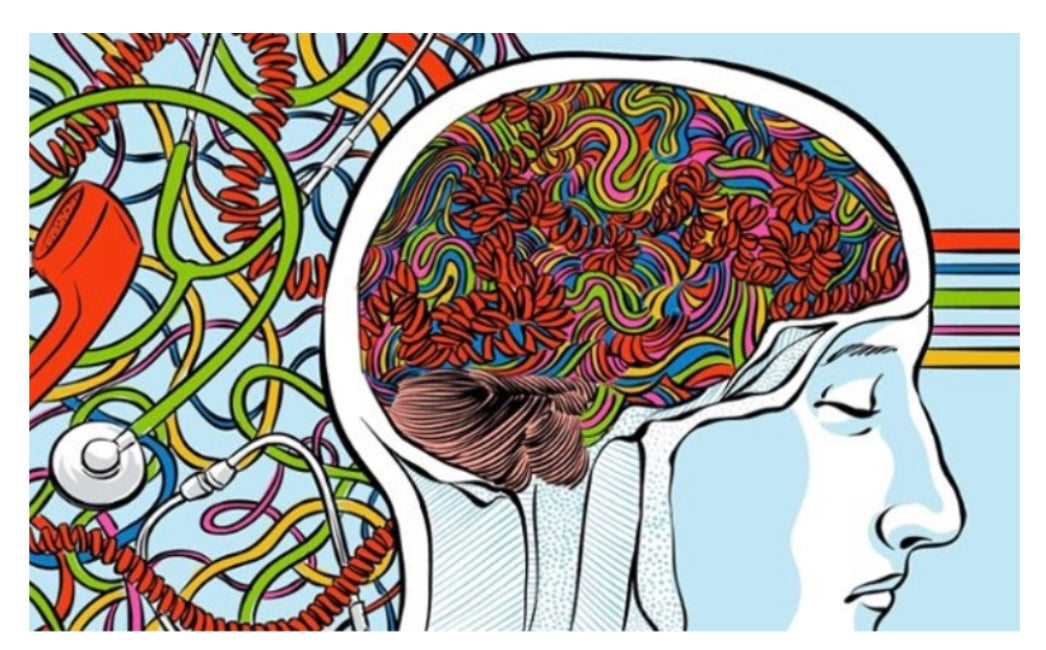The vagus nerve system, are the main nerves of your parasympathetic nervous system. It connects your brain to many important organs throughout the body, including the gut (intestines, stomach), heart and lungs, all of which can have a huge impact on your mental health. The vagus nerve system controls specific body functions such as your digestion, heart rate and immune system. These functions are involuntary, meaning you can't consciously control them.

The word "vagus" means “wanderer” in Latin, which accurately represents how the nerve wanders all over the body and reaches various organs.
But what is really important to note is the "tone" of your vagus nerve. Vagal tone is an internal biological process that represents the activity of the vagus nerve. Increasing your vagal tone activates the parasympathetic nervous system, and having higher vagal tone means that your body can relax faster after stress. The more you increase your vagal tone, the more your physical and mental health will improve, and vice versa.
If your vagal tone is low you can take steps to increase it by stimulating your vagus nerve. This will allow you to more effectively respond to the emotional and physiological symptoms of your brain and mental illness.
Stimulating the vagus nerve and increasing vagal tone has been shown to help treat a wide variety of brain and metal health conditions, including depression, anxiety disorders, Alzheimer’s disease, migraines, fibromyalgia, tinnitus, alcohol addiction, autism, bulimia nervosa, personality disorders, poor memory, mood disorders in the elderly, multiple sclerosis, obsessive compulsive disorder, traumatic brain injury and chronic fatigue syndrome. Here are some ways to stimulate your vagus nerve:
Cold Exposure
Acute cold exposure has been shown to activate the vagus nerve through vagus nerve pathways. Researchers have also found that exposing yourself to cold on a regular basis can lower your sympathetic ‘fight or flight’ response and increase parasympathetic activity through the vagus nerve. Try finishing your next shower with at least 30 seconds of cold water and see how you feel. Then work your way up to longer periods of time.
Deep and slow breathing
Deep and slow breathing is another way to stimulate your vagus nerve. It’s been shown to reduce anxiety and increase the parasympathetic system by activating the vagus nerve. You should breathe in deeply from your diaphragm. When you do this, your stomach should expand outward. Your exhale should be long and slow. This is key to stimulating the vagus nerve and reaching a state of relaxation.
Singing, humming, chanting and gargling
The vagus nerve is connected to your vocal cords and the muscles at the back of your throat. Singing, humming, chanting, and gargling can activate these muscles and stimulate your vagus nerve. And this has been shown to increase heart-rate variability and vagal tone.
Gut Health
Research has shown that gut bacteria improve brain function by affecting the vagus nerve. The presence of healthy bacteria in the gut, balancer the gut microbiome and creates a positive feedback loop through the vagus nerve, increasing its vagal tone.
Meditation
Meditation is an effective relaxation technique, and it can stimulate the vagus nerve and increases vagal tone, positive emotions, and promotes feelings of goodwill towards yourself. In addition, meditation may reduce sympathetic ‘fight or flight’ activity and increases vagal modulation.
Omega-3 Fatty Acids
Omega-3 fatty acids are essential fats necessary for the normal electrical functioning of your brain and nervous system and has shown to help people overcome addiction, repair a ‘leaky brain’, and reverse cognitive decline. Omega-3 fatty acids has also proven to increase vagal tone, enhanced vagal activity, and parasympathetic predominance.
Exercise
Exercise increases your brain’s growth hormone, supports your brain’s mitochondria, and helps reverse cognitive decline. In addition, it has also shown to stimulate the vagus nerve and contribute to optimal brain health.
Massage
Research shows that massages can stimulate the vagus nerve and increase vagal activity and vagal tone. The vagus nerve can also be stimulated by massaging several specific areas of the body. Foot massages(reflexology) have been shown to increase vagal modulation and heart rate variability and decrease the ‘fight or flight’ sympathetic response. Massaging the carotid sinus, an area located near the right side of your throat, can also stimulate the vagus nerve to reduce seizures.
Socializing and Laughing
Socializing and laughing has proven to reduce the body’s main stress hormone through that stimulate the vagus nerve. Research has proven that positive social connections improve vagal tone and increases positive emotions. Laughter has shown to increase heart-rate variability and improve mood.
In summary
Through stimulating your vagus nerve, you can send a message to your body that it’s time to relax and de-stress, which leads to long-term improvements in mood, anxiety, and depression. Through the introduction of a few of the above suggestions into your daily life, you can improve the quality of your health and live more optimally.

